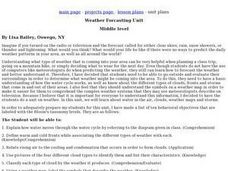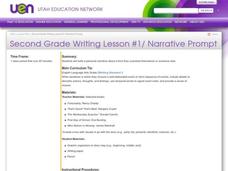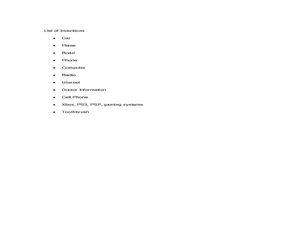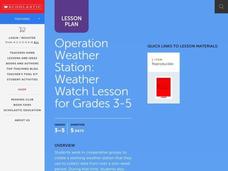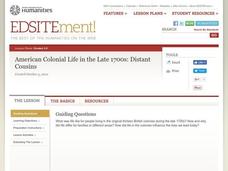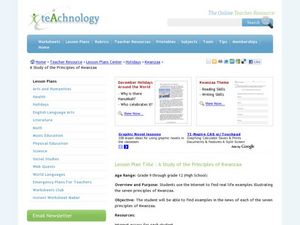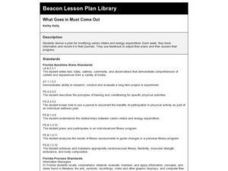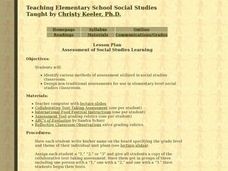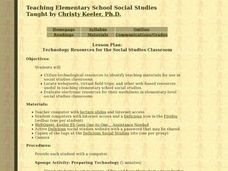Curated OER
Time & Itineraries Two
Students explore time management by participating in clock reading activities. For this itinerary lesson, students define a list of time telling vocabulary terms and practice reading analog clocks with a partner. Students identify ways...
Curated OER
The Radish Experiment
First graders grow radishes. In this Science lesson, 1st graders observe the growth of radishes in both the light and dark. Students discuss what plants need to live.
Curated OER
Weather Forecasting Unit
Students study weather concepts, mapping, characteristics in this series of lessons.
Curated OER
The Presidential Physical Fitness Test
Students practice skills of physical fitness to prepare for The Presidential Physical Fitness Test. They practice daily using specific exercises like curl ups and the one mile run/walk. The lesson allows students to project a profile...
Curated OER
Narrative Prompt
Second graders practice their writing skills on a daily basis. Using a prompt, they write about a time they surprised themselves or someone else. They use a graphic organizer to gather their thoughts before writing the first draft. ...
Curated OER
My Community
Students engage in a lesson about the community in order to find out what different things go on within it on a daily basis. They conduct field research and look up information in order to answer some key questions addressed.
Curated OER
Piece of Pie Chart
In this math worksheet, young scholars examine a pie graph which shows a student's homework over 2 hours. Students read the information, then use a pie chart template (divided into 24 parts) to make their own homework chart.
Curated OER
He's Donating $100 Million to a University
Students explore the concept of social philanthropy. For this social philanthropy lesson, students read an article about billionaires donating money to universities. Students discuss social entrepreneurship and how billionaires are...
Curated OER
Science Inventions
Third graders explore the world of inventions by describing their impact on their own lives. In this technology instructional activity, 3rd graders practice writing descriptive paragraphs about different inventions that they find...
Curated OER
Animal Rights Vs. Animal Welfare - Understanding the Issue
Students explore the difference between animal rights and animal welfare. They take a field trip to a farm to explore the producing animals for human use. After researching and collecting information from animal welfare/rights...
US Apple Association
Apples: A Class Act! (Grades Pre-K–3)
Discover the nutritional wonders of apples and get to know Johnny Appleseed with a plethora of learning experiences that cover subjects math, history, English language arts, health, and arts and crafts. Activities include an apple...
Curated OER
Operation Weather Station
Students work in cooperative groups to create a working weather station. Tkey use the weather station to collect weather data over a one-week period. Students compare the data from their weather station to actual weather information...
Curated OER
The Hippies vs. Authority
Students, in groups, explore the dynamics between hippies and authority figures and create a T-chart outlining the concerns and arguments of both sides.
Curated OER
American Colonial Life in the Late 1700s: Distant Cousins
Students explore daily life and its influences in the late 1700s for two families in different colonies- Delaware and Massachusetts by becoming historical detectives. After gathering information from artifacts to make inferences about...
Curated OER
Sky Watchers: Ancient Astronomers
Students close their eyes and picture the sky. They are asked to brainstorm things they may see in the course of a night and day, such as the movement of the sun, moon, and stars. Students work in groups to coduct their research. They...
Curated OER
Carerrs in Song And Dance
Students write a job posting for a career in the performing arts. They view a Discovery Channel video as an introduction to the types of performing art careers are possible. They choose one that they are most interested in to research on...
Curated OER
A Study of the Principles of Kwanzaa
Discover the seven principles of Kwanzaa and the ways they apply to everyday life. High schoolers use the Internet to research two examples of the principles of Kwanzaa, and share their findings with their peers.
Curated OER
What Goes in Must Come Out
Students monitor their calorie intake and energy expenditure. They keep track of daily data in a journal and assess and adjust their diets as appropriate.
Curated OER
Germbusters
Students identify various germs and discuss how germs are spread. They examine and identify materials in the daily environment, germbusters, which are useful in fighting germs, then play a fun germbuster game to help them remember how to...
Curated OER
Understanding Food Labels
Students determine the number of calories, serving size, and vitamins and minerals in different food products and use this information to create a formula determining the number of calories per serving size and the daily percentages of...
Curated OER
Exploration of the Americas
Third graders demonstrate knowledge of exploration by naming and describing accomplishments of explorers. They use the internet to find corresponding information on the explorer and fill in a chart that is provided. Students also...
Curated OER
Assessment of Social Studies Learning
Identify various methods of assessment utilized in social studies classrooms. You will design non-traditional assessments for use in elementary-level social studies classrooms and discuss what assessment methods may be most appropriate...
Curated OER
Technology Resources for the Social Studies Classroom
Looking for ways to increase engagement by bringing technology into your elementary social studies class? Teachers are introduced to the technology resources available for social studies and then they show their students specific...
Curated OER
Children's Playthings And Books
High schoolers categorize studenT toys by intelligence types. They review toy safety and function and identify the appropriate play age of various toys. They read and evaluate studenT books and write one of their own.




